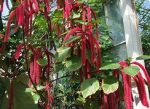 Also known as the Philippines Medusa, red hot cat’s tail, bristly copperleaf, monkey tail, and fox tail this tropical broadleaf evergreen shrub is native to New Guinea, Malaysia but is frequently seen as a container and house plant in the US. It is a member of the spurge family, Euphorbiaceae, that also includes poinsettia, croton, and caster oil plant. The plants grow 5-12′ tall and have soft arching sparsely branched stems carrying alternate, pointed, bright green to coppery leaves that are 6-8″ long and slightly hairy above. In summer male and female flowers are produced on different plants and are carried on axillary pendent catkin up to 20″ long and 1″ wide. The flowers lack petals and range in color from pink, to red and purple. Only female plants have showy, furry-looking flowers due to their feathery pistils. Chenille plant add a tropical note to the garden and may be grown as a hedge or specimen plant in zones 10 and 12 but in colder climates is usually grown in a container and brought indoors in the fall and are especially attractive in hanging baskets. High humidity and consistently moist soil are essential for good growth. All parts of the plant are poisonous if ingested and can irritate the skin on contact. The genus name, Acalypha, comes from akalephe, the ancient Greek name for nettle, and refers to the nettle-like appearance of the leaves. The specific epithet, hispida, is the Latin word for hairy or bristly and may refer to the appearance of the leaves.
Also known as the Philippines Medusa, red hot cat’s tail, bristly copperleaf, monkey tail, and fox tail this tropical broadleaf evergreen shrub is native to New Guinea, Malaysia but is frequently seen as a container and house plant in the US. It is a member of the spurge family, Euphorbiaceae, that also includes poinsettia, croton, and caster oil plant. The plants grow 5-12′ tall and have soft arching sparsely branched stems carrying alternate, pointed, bright green to coppery leaves that are 6-8″ long and slightly hairy above. In summer male and female flowers are produced on different plants and are carried on axillary pendent catkin up to 20″ long and 1″ wide. The flowers lack petals and range in color from pink, to red and purple. Only female plants have showy, furry-looking flowers due to their feathery pistils. Chenille plant add a tropical note to the garden and may be grown as a hedge or specimen plant in zones 10 and 12 but in colder climates is usually grown in a container and brought indoors in the fall and are especially attractive in hanging baskets. High humidity and consistently moist soil are essential for good growth. All parts of the plant are poisonous if ingested and can irritate the skin on contact. The genus name, Acalypha, comes from akalephe, the ancient Greek name for nettle, and refers to the nettle-like appearance of the leaves. The specific epithet, hispida, is the Latin word for hairy or bristly and may refer to the appearance of the leaves.
Type: broadleaf evergreen shrub
Outstanding Feature:Flowering catkins
Form: Mound
Growth Rate:Rapid
Bloom: Pink to red pistilate flowers in catkins up to 20″ long and 1″ wide, in summer
Size: 5-12′ H x 3-8′ W
Light: Full sun with some afternoon shade in very warm climates
Soil: Humusy, fertile, consistently moist, well-drained
Hardiness: Zones 10-12
Care: Deadhead to encourage bloom; feed monthly during flowering period; mist in dry conditions; prune hard to 4-8″ from the ground in spring to encourage new growth, bushiness and increased flowering.
Pests and Diseases: Indoors, whitefly, spider mite, mealybug and scales can be a problem
Propagation: Two or three node cuttings in early spring; seed (but may result in non-showy male plants)
Outstanding Selections:
‘Alba’ (creamy white flowers tinged with pink)
‘Summer Love’ (short pink catkins)
Photo Credit: Wikipedia